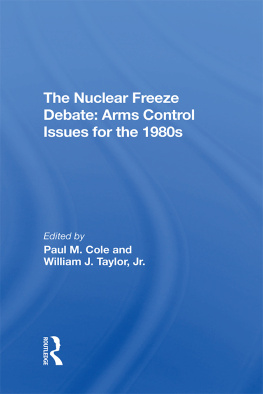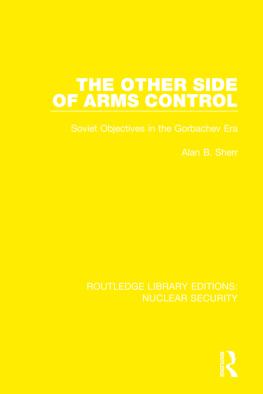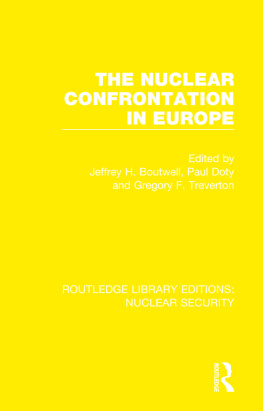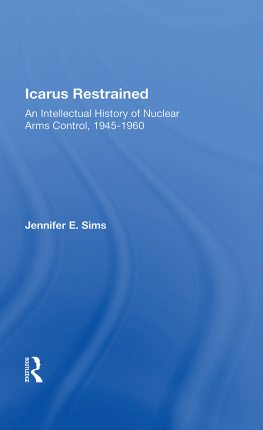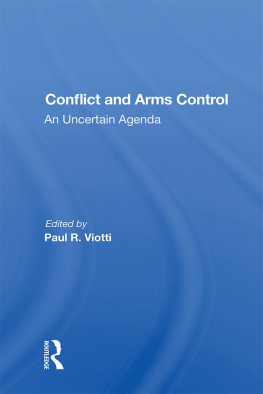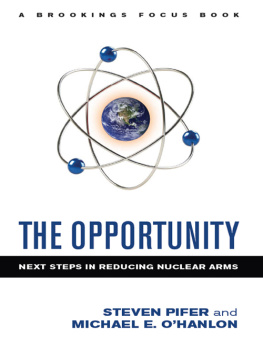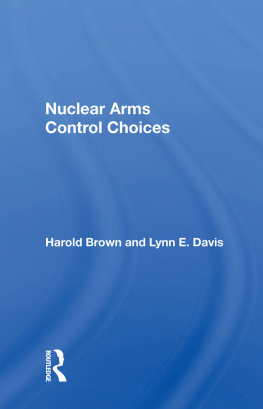The Nuclear Freeze Debate
Westview Replica Editions
The concept of Westview Replica Editions is a response to the continuing crisis in academic and informational publishing. Library budgets for books have been severely curtailed. Ever larger portions of general library budgets are being diverted from the purchase of books and used for data banks, computers, micromedia, and other methods of information retrieval. Interlibrary loan structures further reduce the edition sizes required to satisfy the needs of the scholarly community. Economic pressures on the university presses and the few private scholarly publishing companies have severely limited the capacity of the industry to properly serve the academic and research communities. As a result, many manuscripts dealing with important subjects, often representing the highest level of scholarship, are no longer economically viable publishing projects--or, if accepted for publication, are typically subject to lead times ranging from one to three years.
Westview Replica Editions are our practical solution to the problem. We accept a manuscript in camera-ready form, typed according to our specifications, and move it immediately into the production process. As always, the selection criteria include the importance of the subject, the work's contribution to scholarship, and its insight, originality of thought, and excellence of exposition. The responsibility for editing and proof-reading lies with the author or sponsoring institution. We prepare chapter headings and display pages, file for copyright, and obtain Library of Congress Cataloging in Publication Data. A detailed manual contains simple instructions for preparing the final typescript, and our editorial staff is always available to answer questions.
The end result is a book printed on acid-free paper and bound in sturdy library-quality soft covers. We manufacture these books ourselves using equipment that does not require a lengthy make-ready process and that allows us to publish first editions of 300 to 600 copies and to reprint even smaller quantities as needed. Thus, we can produce Replica Editions quickly and can keep even very specialized books in print as long as there is a demand for them.
About the Book and Editors
The Nuclear Freeze Debate: Arms Control Issues for the 1980s edited by Paul M. Cole and William J. Taylor, Jr.
From a local ballot initiative in Massachusetts, the nuclear weapons freeze movement has grown during the last three years into an important national issue. By 1983, Congress had been asked to consider more than two dozen freeze resolutions, and more than 25% of the voters in the U.S. had the opportunity to vote on state-wide and regional freeze initiatives.
This book explores the issues behind the current debate over nuclear weapons and the freeze movement from a wide range of perspectives. The contributors assess the goals and implications of the freeze movement, examine its origins in religious and secular pacifism, explain the amendments to the original freeze proposal introduced in Congress, and discuss the reaction and policies of the Reagan administration. The nuclear freeze movement is placed in an international context with discussions of recent arms negotiations, European views of U.S. policies, and the possible effects of a freeze on NATO allies and on U.S. national security. The book includes a comprehensive annotated bibliography.
Paul M. Cole is research associate in political-military studies at Georgetown University's Center for Strategic and International Studies. William J. Taylor, Jr. is chief operating officer and director of political-military studies at CSIS.
Published in cooperation with the Center for Strategic and International Studies, Georgetown University
The Nuclear Freeze Debate: Arms Control Issues for the 1980s
edited by Paul M. Cole and William J. Taylor, Jr.
First published 1983 by Westview Press
Published 2019 by Routledge
52 Vanderbilt Avenue, New York, NY 10017
2 Park Square, Milton Park, Abingdon, Oxon OX14 4RN
Routledge is an imprint of the Taylor & Francis Group, an informa business
Copyright 1983 by the Center for Strategic and International Studies
All rights reserved. No part of this book may be reprinted or reproduced or utilised in any form or by any electronic, mechanical, or other means, now known or hereafter invented, including photocopying and recording, or in any information storage or retrieval system, without permission in writing from the publishers.
Notice:
Product or corporate names may be trademarks or registered trademarks, and are used only for identification and explanation without intent to infringe.
Library of Congress Cataloging in Publication Data
Main entry under title:
The Nuclear freeze debate.
(A Westview replica edition)
Bibliography: p.
1. Atomic weapons and disarmament--Addresses, essays, lectures.
2. Arms control--Addresses, essays, lectures. I. Taylor, William J.
(William Jesse). 1933- . II. Cole, Paul M. III. Series.
JX1974.7.N815 1983 327.174 83-10628
ISBN 13: 978-0-367-29450-2 (hbk)
Contents
David M. Abshire, U.S. Ambassador to NATO
, William J. Taylor, Jr., Director, Political-Military Studies, CSIS.
Edward F. Feighan, Representative (D-Ohio)
, Lawrence Freedman, Kings College London
Judith A. Dwyer, Chestnut Hill College
Paul M. Cole, Research Associate, CSIS
George Weigel, World Without War Council
Paul Stares, Guest Scholar Brookings Institution
Douglas M. Hart, Pacific-Sierra Research Corporation
Dennis Kloske, Executive Assistant to the President, CSIS
Robert T. Scott, Assistant Editor, Arms Control Today
The American people are currently debating the role of nuclear weapons in our national defense policy. Via their elected representatives and through traditional channels of democratic expression, the citizens of the United States are also demanding a greater voice in the formulation of nuclear weapons policy. In the foreseeable future, decisions taken by the United States government concerning these weapons will be scrutinized and questioned by an unprecedented percentage of the population, particularly the younger generations. There is a great need, therefore, for clear information and analysis of this critically important and complex issue.
This book could not have appeared at a more appropriate time. The chapters focus on heightened concern in Western Europe and the United States about the size and direction of nuclear weapons programs and their potential impact on international security. Current and historical issues are presented in a concise, readable form. I know of no other book that offers the lay person such a cogent survey of nuclear freeze related issues.
The next two years will be of great importance to the future of NATO. Anti-nuclear and neutralist movements throughout Western Europe oppose the modernization of NATO's intermediate-range nuclear forces and question the utility of the alliance's nuclear deterrent. The debate has also spread to the United States where the nuclear freeze movement has been at the center of public attention. The evolution of this debate is bound to influence the modernization of our own strategic forces and may eventually affect the U.S commitment to the defense of Europe.


